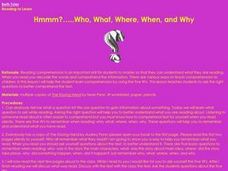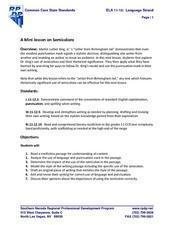Curated OER
Hmmm...Who, What, Where, When, and Why
Students practice reading comprehension by answering the 5 "W" questions. After reading "The Kissing Hand," they complete a class discussion addressing the questions who, what, when, where, and why. Students choose an appropriate,...
Curated OER
Why Not Come to North Amercia?
Students examine the motives for French expansion into the New World, they evaluate primary source documents to determine who, what, when, where and why.
Curated OER
Build Masters: Identifying Details
Find key details in books using this note card strategy. Each reader gets six cards with the classic who, what, where, when, why, and how detail prompts. After they read the book, they choose a card and locate a key detail answering the...
Curated OER
Question words, question marks
Practice the five W's and question marks with a fun grammar worksheet. After copying the words who, what, where, when, why, and how, kindergartners fill the words into various questions. For extra practice, have kids come up with their...
Curated OER
Solving the Puzzle
Students create a map showing the United States borders at a specific period in history and produce three questions to be answered by examining the map. They also write a productive paragraph explaining who, what, when, where, how/why a...
National Endowment for the Humanities
People and Places in the North and South
North and South: two opposite directions and two opposite economic and social systems in time of the Civil War. Pupils peruse census websites and primary source photographs to understand what life was like for the everyday person before...
PBS
Family History: Those with Lofty Ideals
Would you stand up for your beliefs, no matter the cost? Scholars investigate their own families to uncover examples of how and when someone stood up for their ideals. Using video clips, interviews, and eulogies, they come to understand...
Curated OER
What Science Suggests About 'Weather Weirding'
Here is an activity that you can use to help upper elementary or middle schoolers to meet Common Core literacy standards for science and technology. Youngsters read the article on extreme weather patterns, "Weather Runs Hot and Cold, So...
Perkins School for the Blind
Bagging Groceries
Bagging groceries is a skill that can help learners with visual impairments understand organizing, problem solving, and weight discrimination. In addition, it is also a wonderful job skill. Help learners as they determine how to bag...
Chicago Botanic Garden
Migration, Adaptation, and Changing Climates
It is easy for humans to adapt to changing environments, but how do animals and plants do it? Classes discuss how plants and animals deal with environmental changes in the second of seven lessons. Through questions and discussions,...
Computer Science Unplugged
The Peruvian Coin Flip–Cryptographic Protocols
A digital flip. Introduce your classes to cryptographic protocols using and, or, and not gates. Groups create a complete circuit to convert a binary number into another one. This type of one-way function allows pupils to verify the...
Mobile Education Store
Rainbow Sentences
Learners who struggle with grammar, foundational reading skills, and sentence composition can learn how to write proper sentences using an app that relies on research-based practice. It uses a color-coded formula that had been proven to...
Curated OER
Who, What, Where, When, Why?
In this creating information questions and answers worksheet, students write who, what, where, when, and why questions write answers in complete sentences, and complete a dialogue. Students write 19 short sentences.
Curated OER
What Is a Neighborhood?
Students be asked to think about the neighborhoods in which they live, to consider what exactly makes up a neighborhood, and the current issues their neighborhood may be facing.
Curated OER
Where Am I: How to Read a Map
Third graders develop an understanding of maps. They explore what a map is, who uses maps, and how to use maps. Students investigate the compas rose. They create a compose rose which illustrates the cardinal directions. Students practice...
Curated OER
Where Will I Go From Here?
Students research the various cultures in Colonial America. For this American history lesson, students analyze and complie the research they find presenting what they have found into a short presentation.
Curated OER
The Virtuoso Phenomenon
After reading the New York Times article "Virtuosos Becoming a Dime a Dozen," learners answer eight who, what, when, where, and why questions. They post their answers on the New York Times Education Blog. A fun way to get learners...
Curated OER
Sunday Night With Oscar
And the winner is.....! The Academy Awards are a big deal in film and often make top headlines in the paper. Kids read an article about the most recent Academy Awards Ceremony and answer 11 questions about who won what award, and why.
Curated OER
Who, What, When, Where And Why is He There?
Students examine the process of asking the 5 W questions in order to increase their reading comprehension while reading non-fiction passages. They review silent reading techniques before listening to a teacher read aloud, and discussing...
Mathematics Vision Project
Module 6: Congruence, Construction, and Proof
Trace the links between a variety of math concepts in this far-reaching unit. Ideas that seem very different on the outset (like the distance formula and rigid transformations) come together in very natural and logical ways. This unit...
Southern Nevada Regional Professional Development Program
A Mini lesson on Semicolons
Dr. Martin Luther King, Jr.'s "Letter from Birmingham Jail" serves as an exemplar for a mini-instructional activity on semicolons. Working alone or in small groups, class members first circle all the semicolons in the letter, and then...
The New York Times
Literary Pilgrimages: Exploring the Role of Place in Writers’ Lives and Work
Do the places you have lived influence what you write? Class members research the lives of writers and look for how places these writers have lived might have influenced their writings.
Deliberating in a Democracy
Parental Liability
How many teenagers have wanted their parents to let them make their own decisions? The answer is ... all of them! Scholars investigate where parental liability begins and ends in the eyes of the law. Using case studies and legal...
Museum of Disability
Taking Down Syndrome to School
Teach your class about the ways they can befriend and understand people who are different from them with a reading comprehension lesson. As youngsters read Taking Down Syndrome to School by Jenna Glatzer, they answer a series of...
Other popular searches
- Who What When Where Why How
- Who What Where When Why
- Who, What, When, Where, Why
- Who/when/what/where/why
- Who What When Where and Why

























